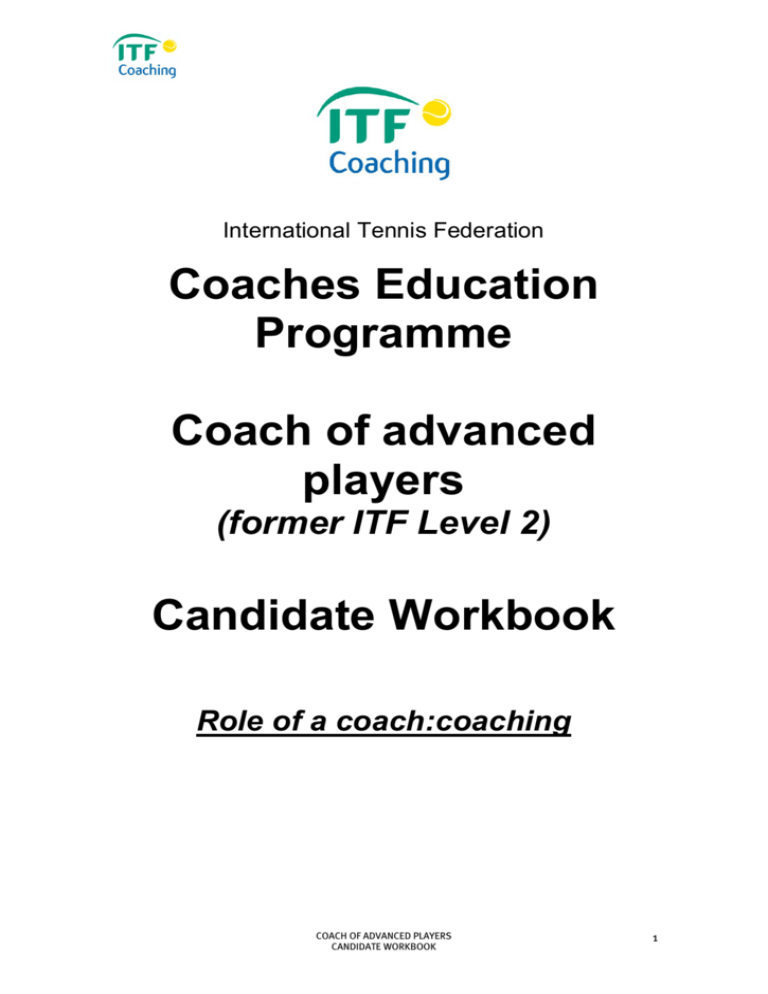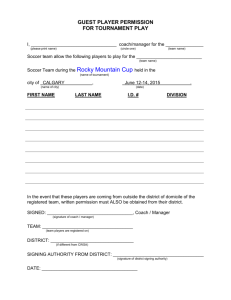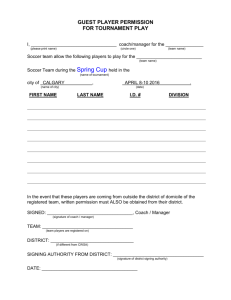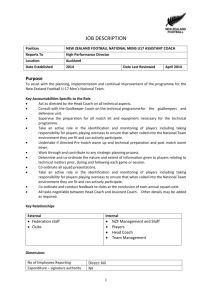
International Tennis Federation
Coaches Education
Programme
Coach of advanced
players
(former ITF Level 2)
Candidate Workbook
Role of a coach:coaching
COACH OF ADVANCED PLAYERS
CANDIDATE WORKBOOK
1
Copyright © ITF Coaching 2008
All rights reserved. The reproduction or utilisation of this work in any form or by electronic,
mechanical, or other means not known or hereafter invented, including photocopying,
xerography, and recording, or in any information storage and retrieval system, is forbidden
without written consent and permission of ITF. This permission should be sought by contacting
ITF Coaching.
Written by Miguel Crespo
ITF Coaching
Bank Lane Roehampton
London SW15 5XZ
coaching@itftennis.com
www.itftennis.com/coaching
Tel./Fax. 34 96 34 61 90
Disclaimer
Whilst care has been taken in the preparation of this workbook the ITF and the contributing
authors do not accept any responsibility for any loss, damage or injury caused directly or
indirectly by, through, or in connection with, any drill, skill, action, instruction or suggestion
depicted in this workbook. Coaches, players and others undertake any drill, skill or action at
their own risk.
How to use this workbook
This workbook has been designed to assist you on your journey to becoming an ITF Coach of
advanced players of the activities you will cover during the course on-court sessions is outlined
in this workbook. There are also sections where you can reflect on your coaching knowledge
and skills and how you think you are going at different stages of the course.
The ITF Coach of advanced players’ course is made up of four units. The assessment tasks for
many of the units have been integrated (that is, several performance criteria from several units
are assessed at the same time). This Off-Court Workbook focuses on all units of competency.
You will be required to bring this workbook to all on- and off-court sessions and it should serve
as a useful resource in completing your course assessment tasks and during your coaching
career.
PERSONAL DATA
Name:
Contact details:
- e-mail:
- phone:
Course venue:
Course dates:
Course tutors:
COACH OF ADVANCED PLAYERS
CANDIDATE WORKBOOK
2
COACH OF ADVANCED PLAYERS COURSE
UNIT CONTENTS
Contents
Coach of advanced players
Unit
No
Unit Title
Content title
Unit 1
Sub Unit
1.1.
Content general description
Coaching advanced players
Level of play
Level of play
Sub Unit
1.2.
Training theory
(Sport Science)
Sub Unit
1.3.
Training practice
(individual & group)
Sub Unit
1.4.
Equipment and
facilities
Unit 2
Philosophy of coaching
Biomechanics
Teaching methodology
Motor learning
Psychology
Physiology
Growth and development
First aid
Physical conditioning
Planning and organisation
Tactics
Communication
Biomechanics
Teaching methodology
Motor learning
Tactics
Psychology
Balls
Rackets
Courts
Teaching aids
Show competency at ITN 3-6
Understand and apply the basic training theory
principles to coaching advanced players
Understand and apply the basic training practice
principles to coaching advanced players
Understand and apply the basic equipment and
facilities to coaching advanced players
Organising competitions for advanced players
Organising
competitions
Unit 3
Rules of tennis
Competition formats
Code of conduct
ITN
Scoring systems
Understand and apply the fundamentals of
competitions to organise competitions for
advanced players
Managing and marketing tennis programmes for advanced players
Managing and
marketing tennis
programmes
Unit 4
Leadership
Management
Administration
Marketing
Planning
Organizing
Control/Evaluation
Ethics and Legal issues
Understand and apply the fundamentals of
management and marketing to organise
programmes for advanced players
Educating advanced players, parents and coaches
Education
Well-being
Awareness
Personal development
Anti-doping
Educational programmes
Parent-children relationship to
tennis
Understand and apply the fundamentals of
education to organise educational programmes
for advanced players
COACH OF ADVANCED PLAYERS
CANDIDATE WORKBOOK
3
ACTIVITY
2
Title
The role of the coach – Philosophy of coaching
Units
1. Coaching advanced players
2. Organizing competitions
3. Managing and marketing tennis program for advanced players
4. Educating advanced players, parents and coaches
Sub-unit
1.1 Level of play – Level of play
1.2. Training theory – Sport Science - Philosophy of coaching
1.3 Training practice – Individual & Group – Communication
1.4 Equipment and facilities
Resources
ITF Coaching Advanced Players – Chapter 1
ITF Coaches Code of Ethics
http://www.itftennis.com/coaching/practicalinfo/codeofethics.asp
ITF Communication Skills Checklist
http://www.itftennis.com/shared/medialibrary/pdf/original/IO_24165_original.PDF
Hassan, F. (1997) What makes a good coach? ITF CSSR, 12, 9.
http://www.itftennis.com/shared/medialibrary/pdf/original/IO_7867_original.PDF
Stojan, S. (1997). What makes a good coach indeed? 13, 14-15.
http://www.itftennis.com/shared/medialibrary/pdf/original/IO_7868_original.PDF
Content title
Philosophy of coaching and the role of the coach
Competencies
Display basic effective communication (verbal and non-verbal elements):
Introduction: Meeting and greeting the players, parents, coaches, etc. Introduce yourself, the
players and the goal of the session accordingly (i.e. general background). Try to cause a good first
impression (i.e. body language and presentation). Get the attention of the group to start the
session.
Effective questioning: Demonstrate questioning (open and closed) and communication skills in
accord with the best practice principles of tennis. Make relevant points of emphasis before, during
and/or after presentation/s.
Feedback: Provide specific and relevant and balanced (praise : criticism) feedback to the advanced
player and other support personnel in accord with the best practice principles of the sport/activity.
Include KR (knowledge of results) and KP (knowledge of performance) types.
Adaptation: Use special presentation techniques or activities to comply with the needs of players
where appropriate. Adapt the communication to the situation (pre- or post match) and the
characteristics (gender, level of play, previous competitive history) of the players.
Understanding: Check for understanding of the instructions / comments and provide advanced
players with the opportunity to comment and/or ask questions (interactive approach).
Voice and language: Appropriate use of voice (volume, pitch, tone) and language (clear and
concise).
Body language: Ability to project a positive image, effective use of smile and visual contact.
Professional image: Ability to project an adequate professional image (clothing and general
appearance).
Motivation, humour: Ability to use effectively motivation techniques and humour to create a
positive training atmosphere.
Closing: Close the session “selling” the next one by effectively pointing out aspects to be improved
and worked on in future sessions.
Developing and applying a coaching philosophy in the plan:
Develop a basic and general philosophy of coaching (learner centred).
Establish the appropriateness of training and competition levels and other activities in relation to
each player's stage of development.
Identify engaging / enjoyable task-oriented coaching activities that promote participation.
Ability to basically use “communication skills/styles”.
Clarify personal philosophies relating to sportsmanship, winning/losing and holistic development
of the player in relation to particular situations and player groups.
Document the role of the coach in regard to required tennis specific skills and knowledge according
to accepted practices and the tennis culture.
Identify and document the basics of the stage of skill learning.
Identify the basic benefits of planning.
Understand the basic principles of goal-setting (long, mid, short-term).
Plan the session in advance, individually or with assistant coaches.
Follow a Code of Conduct for tennis coaching.
COACH OF ADVANCED PLAYERS
CANDIDATE WORKBOOK
4
Role of the coach:
Understand the fundamentals of the role of the coach when working with advanced players.
Understand the importance of the “own qualities” (how to be) when coaching.
Possess the necessary dedication and commitment to high standards to introduce people to
tennis.
Strive for developing basic autonomy and responsibility.
Take basic responsibilities for completion of tasks, demonstrate some independence in your
coaching role, manage your role under guidance in predictable work contexts, and supervise others
works (assistants).
Assess basic strengths and weaknesses as a coach:
Use a basic SWOT analysis to evaluate yourself as a coach.
Able to basically recognise own level of competence.
Access ongoing coach education:
Research and document further fundamental education/training that will enhance the player's and
coach's professional development.
Demonstrate self-responsibility and self-direction in own learning.
Improve basic communication and social competence by taking responsibility for using selfunderstanding to change behaviour.
Demonstrate ability to access ongoing basic coach education resources, information and
equipment.
Identify basic opportunities for continuous education.
Plan for tennis and non-tennis education to advanced players, fellow coaches and parents off-court:
Plan tennis and non-tennis basic educational activities off-court.
Collect basic information to help out in the planning process.
Consider the planning of educational activities as part of the learning process of all involved.
Develop, implement and evaluate a basic programme to address coach well-being:
Undertake a basic lifestyle needs assessment.
Select the most fundamental relevant strategies to address lifestyle needs.
Prepare and action a basic plan to address any lifestyle needs.
Evaluate the effectiveness of these strategies for creating a more balanced lifestyle.
Organise basic educational activities for advanced players when travelling.
Encourage talented advanced players to continue with their academic activities.
Implement a personal development plan:
Understand the importance of solving basic problems using and integrating well known
information from expert sources taking account of relevant social and ethical issues.
Enrol in a personal development plan to improve as a tennis coach.
Be able to gain feedback from others.
Address drugs in tennis, child protection and healthy habits issues:
Access fundamental concepts of drugs in tennis and healthy habits resources and information.
Advise players regarding fundamental sources of information on tennis in sport and healthy habits
issues.
Adhere to basic tennis specific rules, policies and regulations relating to drugs and healthy habits
in tennis.
Advise players on fundamental child protection principles and guidelines.
Address education in values through tennis:
Ensure players, coaches and parents learn appropriate values through tennis play.
Sportsmanship issues:
Ensure fundamental sportsmanship and fair play behaviours are used by players, coaches and
players at all times.
Apply basic self-refection techniques to evaluate and modify coaching performance:
Apply basic self-refection procedures to assess coaching performance/behaviour.
Basically review coaching sessions and overall coaching performance.
Time
allocated
120 minutes
Materials
needed
Pen and paper
1. Philosophy of coaching: Review your past experiences in tennis coaching. Examine
them critically. Describe your most outstanding experiences in this field. Why?
Describe your most disheartening experiences. Why?
COACH OF ADVANCED PLAYERS
CANDIDATE WORKBOOK
5
2. Identify a tennis coach (physical educator) that you particularly admire and motivate
your choice, also give that person’s philosophy of sport.
3. Review and list philosophies of leaders in physical education and sport. Determine
and explain which of their beliefs are compatible with yours and which are not
compatible
COACH OF ADVANCED PLAYERS
CANDIDATE WORKBOOK
6
4. Write in your own words your coaching philosophy
5. Read a biography of a sport or tennis personality and discuss his/her philosophy of
sport under the following headings
1. The influences of his/her parents; women (wife and or girlfriends) coach and society
2. His or her perceptions (experiences/attitudes) on: success; failure; relationships; life in
general and status etc. You can identify and discuss more relevant variables.
6. Self-awareness is the ability to know who you are. Two characteristics of a positive
self awareness are: 1) being a positive role model 2) being consistent and reasonable
in your actions. Using the boxes below describe in your own words how you can
adhere to these two characteristics
1. Being a positive role model
COACH OF ADVANCED PLAYERS
CANDIDATE WORKBOOK
7
2, Being consistent and reasonable in your actions
7. The three types of self are: ideal, public, and real. Give your interpretations of the
three types of self and explain how this applies to your tennis coaching.
Ideal
Public
Real
8. Self disclosure relates to a coach having to disclose himself as a person to the
athlete. To what extend and why should a coach have to do this?
COACH OF ADVANCED PLAYERS
CANDIDATE WORKBOOK
8
9. Which persons are the most influential in the development of your self-concept
10. Describe the prominent role you have to play as a coach in the following scenarios
1. Producing a positive, high quality approach by the player:
2. Leading and directing performers:
3. Counselling, advising, supporting especially in times of need:
11. Please find on the left hand side of the table characteristics of a leadership style, try
and match up the characteristics with the coaching style on the right hand side of the
table. There can be more than one characteristic to a coaching style.
Characteristic
Coaching style
Authoritarian (Command)
Athlete centred
1
A
Coaches make all the decisions
2
Co-operative
B
No Objectives/check player independence
3
Causal (Lassiez Faire)
C
Coach dependent
4
5
Listening
6
Self-judgement by athlete with coaches help
7
Coaches shows little or no trust in the
athlete
8
Coaches role in motivation is to give no
motivation
9
Training structures are flexible
COACH OF ADVANCED PLAYERS
CANDIDATE WORKBOOK
9
12. Which coaching style do you use predominately, or does it depend on the coaching
situation
1. Coaching style:
2. If it depends on the situation provide examples of the each style and situation you would use
that style
3. Your predominate coaching style that you use currently, is it an efficient one in your opinion if
so please clarify and if not what coaching style would you like to progress to?
13. Please find the general actions of empowerment to be an effective leader. For each
action explain how you can incorporate or how to best deal with each action
Effective goal setting
Development of a psychological and social environment
Formulation of a code of conduct:
Motivational?
Crisis Management?
Communication
COACH OF ADVANCED PLAYERS
CANDIDATE WORKBOOK
10
14. In the table below are the six steps in communication. However, they are not in order.
Please put them in order by putting the corresponding number to the step on the
right hand side of the table.
1
The coach transmits the message
through a channel
Step 1:
2
The message is being interpreted
by the athlete. This action depends
upon the athlete’s comprehension
of the message’s content and your
intentions
Step 2:
3
The coach experiences thoughts
that you wish to express
Step 3:
4
The athlete receives the message
Step 4:
5
The athlete responds internally to
his or her interpretation of the
message
The coach translates the thoughts
into a message appropriate for
transmission
Step 5:
6
Step 6:
15. Give 4 examples in a practical situation of ineffective communication.
1.
2.
3.
4.
16. Think of 4 characteristics of command style communication and a practical example
where you would use this style of communication
1.
2.
3.
4.
Practical example:
COACH OF ADVANCED PLAYERS
CANDIDATE WORKBOOK
11
17. Think of 4 characteristics of co-operative style communication and a practical
example where you would use this style of communication
1.
2.
3.
4.
Practical example:
18. Think of 4 characteristics of submissive style communication and a practical
example where you would use this style of communication
1
2.
3.
4.
Practical example:
19. Ask another coach to attend one of your coaching sessions and check your voice
skills as listed in the ITF Communication Skills Checklist. Write down that coach’s
feedback and indicate how you will improve these skills.
Feedback
How to improve
1
2
3
4
COACH OF ADVANCED PLAYERS
CANDIDATE WORKBOOK
12
20. Listed below are 6 skills in the development of communication. For each skill
evaluated yourself and give 2-3 ways to develop this skill
Skill 1: Develop credibility in communication
Skill 2: Communicating with a positive approach
Skill 3: Sending messages high in information
Skill 4: Communicating with consistency
Skill 5: Learning how to listen
Skill 6: Improving your non verbal communication
COACH OF ADVANCED PLAYERS
CANDIDATE WORKBOOK
13
21. Having a professional image and good presence on the court while coaching is
important in conducting a productive lesson. Write down a 50 words paragraph
which includes your experience on this issue.
22. How would you deal with the following scenario: As a club coach you are in charge
of putting the league teams together and getting them to the relative clubs for their
matches. You accidentally gave the wrong information to the players and they turned
up at the wrong club and ended up getting defaulted as a result of a no show. It was
the last game of the season and because your club was defaulted they are now
relegated to the division below. The players are not happy how would you deal with
this situation?
COACH OF ADVANCED PLAYERS
CANDIDATE WORKBOOK
14
23. Please find below different scenarios and explain how you would communicate in
each situation.
1. Your players has just lost a match after being a set and 5-2 up and serving:
2. Your player did not perform well but won:
3. Your player performed well but lost:
4. Your player performed badly and lost:
5. Your player played well and won:
6. Your player got defaulted in a match through code violations:
24. List below your long term, medium term, short team business goals as a coach.
Long term goals:
Medium term goals:
Short term goals:
COACH OF ADVANCED PLAYERS
CANDIDATE WORKBOOK
15
25. With the information from question 24 now list your objectives on how you would
achieve your Long term, medium, and short term goals.
Long term objectives:
Medium term objectives:
Short term objectives:
26. You have just learned that a new club has just been built. The developers are asking
for applications for coaches. Give an outline of a business plan you might put
together to apply to run the club.
COACH OF ADVANCED PLAYERS
CANDIDATE WORKBOOK
16
27. Submit a copy of your CV.
28. List as many ideas as possible on how to improve yourself as a coach
29. Draw or elaborate on a mental map that includes the most important qualities of
ethical principles in coaching
COACH OF ADVANCED PLAYERS
CANDIDATE WORKBOOK
17
30. Identify your strengths and weaknesses as you perceive yourself as a tennis coach.
1. Strength
2. Weakness
31. Ask a colleague that knows you well to list in their eyes your strength and
weaknesses.
1. Strength
2. Weakness
COACH OF ADVANCED PLAYERS
CANDIDATE WORKBOOK
18






